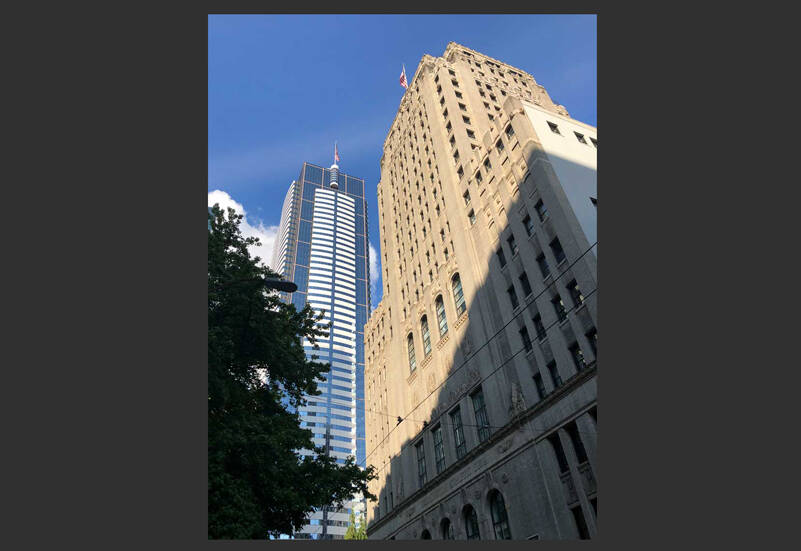By Morf Morford
Tacoma Daily Index
I am of the generation whose parents lived through World War II and the Great Depression and whose children are considered millennials.
To put it mildly, the two generations surrounding many of us who are still working, recently retired or looking forward to retirement look at life, work and money entirely differently.
The World War II generation saw and experienced scarcity, sacrifice and deprivation. And a time when those of all backgrounds and political philosophies worked together in a common cause.
That generation, called The Builders, or even The Greatest Generation by demographers and sociologists, fought for, reclaimed, and even, to a large degree, built the world that most of us still, a generation or two later, work in, travel on and inhabit.
For that generation everything was solid and tangible. From “physical media” like records or books, or even cash money, value, entertainment and status were embodied in actual, physical objects.
Credit cards were considered an extravagance, which meant that, unlike now, it was very difficult to spend money one did not have. In an odd sense, back then, you had to have money to owe money.
To be poor back then, as many were, meant to have next to nothing – it did not mean having less than nothing – as in debt.
Living in the physical world
Information and music, for example were “owned” and often displayed to show one’s sophistication or breadth of knowledge and experience.
In work and careers, occupational fields did not need to be explained.
The work that a plumber, dentist, electrician or school teacher did, or does, was self-evident and did not require explanation.
For that generation, everyone ate the same food, watched the same television and listened to the same music.
Radio stations back then (and everyone listened to the radio back then) played music that appealed to everyone. If you were listening to the radio, listening to one station or switching the dial, you would hear country-western songs, excerpts from Broadway musicals, rock and roll, folk or jazz.
Radio stations, unlike those now, were not demographically or genre-defined. There were no “oldies” stations and no “soft rock,” jazz or Gospel stations – everyone played, and listened to, everything.
Homes back then were “affordable” though no one used that word. Homes were “affordable” because they were basic shelter.
There were no “big-box” stores and no McMansions and few, if any granite counters or elaborate building materials.
Homes were made of wood and concrete. And often by friends and neighbors who helped when they could.
One electric outlet per room was common. And few homes had more than one bathroom.
In 1953, for example, the median new home price was around $18,000 – double or triple the average income at the time – which for almost every family, was a single-income.
Real estate agents were rare – and sales were often between friends without legal or professional intervention. I know of a couple families who literally traded homes without an agent.
Mortgages were rare – home buyers often saved and bought their homes with cash.
My parents, for example, bought a property (with cash), had a basement dug, and with each paycheck bought building materials and they, and the occasional friend, built the house around them as they lived in the basement and the gradually accumulating structure.
I doubt if such a process would be legal now.
But many of that generation had housing – and equity, if not consequential generational wealth- from just such an approach to housing.
That was then
To emphasize the obvious, none of that is true now.
Scarcity and deprivation or austerity of any kind or even deferred gratification are incomprehensible abstractions to the vast majority of millennials.
When I first heard of people buying “toast” (avocado or not) at a restaurant, I assumed it was a joke.
Everyone now seems to have “food issues”; sensitivities, allergies or ethnical concerns wrapped around what they eat.
Back then for example, bread was bread and milk was milk.
Now everything is locally sourced, artisan, grass-fed, free-range and “natural”.
What do you do?Sorry I asked.
Ever ask someone under 40 what they do for a living? You are, at least half the time, likely to get an answer incomprehensible to a previous generation.
To an earlier generation, being a “consultant” was a code-word for being unemployed.
To young people, being a social-media “influencer” is a perfectly reasonable job title/career track.
I know “professional gamers” – whatever that might mean.
And they make far more than I ever have. Or will. A previous generation, as children, might have dreamed of being a fireman, a doctor or an astronaut. Did millennials as children dream of being a technologist? Or a project manager? A full-stack developer? Or even a data scientist?
Mommas don’t let your babies grow up to be systems analysts
Many millennials make double or triple the most I’ve ever made in a year. Many of them spend more on lunches in a month than my house payment.
SPACs, NFTs and cyber-currencies are the financial equivalent of streaming media – here now, but where tomorrow? And who really owns anything?
The gig economy has become the gig life-style
In an economy where “ownership” has become a liability, less, in a way, is in fact, more.
Who needs a car (and related car expenses from insurance to maintenance) in an economic system with options like Uber or Lyft?
And when it comes to home-ownership, I’ve heard of people living semi-permanently in AirBnBs. And realistically, why not? Who wants a house and yard to keep up?
And, as in the Puget Sound area, when the average new monthly mortgage is about $4,500 (which factors to about $150 each day) why sign up for a near life-time financial obligation?
No, this is not your grandfather’s economy.
But maybe we’d all be a lot better off it was.
Or at least a little closer to it.
There are, after all, worse things than being poor.
Sometimes when I see a particularly extravagant or wasteful young person in action, I think to myself, “That’s nothing that a day going hungry wouldn’t cure.”
Many young people I know make vastly more money that I ever have, but it, like their music, flows over them, with little meaning or impact.
Life is but a stream
Young people, and perhaps all of us to a degree, live in a streaming culture, where everything seems to wash by or over us, and nothing is ever fully “ours” and nothing is even quasi-permanent.
Young people might not believe it, but a little austerity won’t kill us, and like the old saying goes, it just might make us stronger.
And, based on what I see as the economy coming our way, strength and flexibility might be the most important attributes ever.





